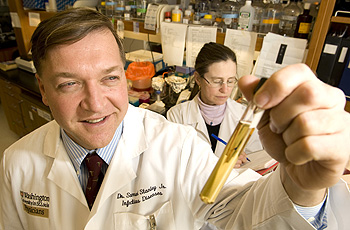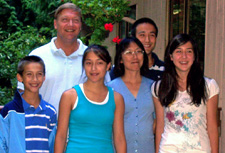Located smack in the middle of the United States, St. Louis seems an unlikely place to study tropical diseases typically found half a world away in Africa and Asia. But when Samuel L. Stanley Jr., M.D., came to Washington University as a fellow in 1983, he knew he wanted to devote his career to tropical diseases, having spent time treating patients in Africa as a Harvard medical student.

After completing fellowships in infectious diseases and in microbiology and immunology, Stanley stayed at the University to work on an often-overlooked scourge common in the tropics, amoebiasis. This intestinal infection is spread by a parasite and causes some 40 million cases of dysentery and 70,000 deaths annually.
“I had seen several cases in Africa, and there really wasn’t a lot of real good research going on,” Stanley says. “No one here was working on it, and I knew I would have to start from scratch. But I found many mentors who were very encouraging, and I really felt as though they cared about me and wanted to support me in my career. That made all the difference.”
In the 25 years Stanley has been a part of the University community, he has made pivotal discoveries in infectious diseases, and today he is known internationally as a leader in the field. Named the University’s vice chancellor for research in 2006, he now has an additional role: supporting and encouraging faculty in their research efforts so they can realize their goals, too.
“My mission is to support faculty in their research endeavors, and that includes helping them obtain funding, administering their grants and making sure they are in compliance with the appropriate federal regulations,” Stanley says.
In this position, he oversees the University’s strong and vibrant research enterprise, one that brings in more than $500 million annually for wide-ranging projects at the School of Medicine and the Danforth Campus.
“Dr. Stanley has enjoyed a very successful career at Washington University, and we have benefited enormously from his research and leadership,” says Chancellor Mark S. Wrighton. “As a well-respected and successful researcher in the field of infectious diseases, Sam has already made great strides in his relatively new role as vice chancellor for research. He has led important changes in the Office of Technology Management that have improved efficiency and helped to generate a greater enthusiasm for technology-transfer efforts.”
With his track record as a successful and visionary researcher, Stanley offers guidance and support welcomed by his colleagues.
“He’s an amazing person,” says Herbert W. “Skip” Virgin, M.D., Ph.D., head of the Department of Pathology and Immunology. “Sam has an incredible amount of energy and enthusiasm, great innate intellectual ability and an incisive sense of what is top-notch science. He’s highly regarded by the faculty, and we are quite willing to entrust our projects to him.”
Interest in global health
Stanley was only 4 when his family left Seattle for a two-year stint in Jakarta, Indonesia. His father, a cultural anthropologist, had received funding from the Ford Foundation to study how villages in remote parts of the country were organized and the villages’ kinship structure.
The international experience made an early impression and planted the seed for a career in global health. “Indonesia was my introduction to other cultures and the start of an interest in international health, even at a young age,” he says.
|
Samuel L. Stanley Jr. |
|
Education: B.A., with honors, biological sciences, University of Chicago; M.D., Harvard Medical School Family: Wife, Ellen Li, M.D., Ph.D.; children: Jim, 22, graduated from Yale University and is applying to law school; Susie, 20, a junior at Stanford University majoring in chemistry and biology; Katie, 18, Stanford University-bound high school senior; Sam III, 12, seventh grader Hobbies: Reading, especially fiction, Russian classics and Charles Dickens; traveling and hiking with his family; basketball |
As a medical student, Stanley gained firsthand experience treating infectious diseases and other illnesses. In 1979, he was selected as a fellow and spent three months at the Albert Schweitzer Hospital in Lambarene, Gabon, in western Africa. As a fourth-year student, Stanley had completed his medicine, pediatrics and surgery rotations but admittedly was “still pretty green.”
He learned quickly on the job, especially during his time at the adjoining pediatric hospital. That hospital’s only pediatrician went on vacation, leaving Stanley essentially in charge. He learned to rely on thorough physical exams and medical histories to make diagnoses, as X-rays were limited and few blood tests were available on site.
“It was an incredible experience, and I think it made me a much better doctor,” he says. “When I started my residency at Massachusetts General Hospital, I was really prepared because I had had that responsibility and patient-care experience.”
During his residency, Stanley met and married Ellen Li, M.D., Ph.D., professor of medicine and a graduate of the University’s M.D./Ph.D. program, who was also in the midst of her residency training. She was being heavily recruited to return to St. Louis for her fellowship training and persuaded Stanley that WUSTL would be a good fit for him, too.
“Ellen had an outstanding experience at Washington University, and she was really very high on coming back,” Stanley says. “I was impressed by the infectious diseases program here, so I gave up my fellowship spot in Boston, and we both came to Washington University.”
Focusing on infections
Early in their careers, Li, now a professor of medicine, and Stanley, who also is professor of medicine and of molecular biology, collaborated on amoebiasis studies. They used cell lines Li generated as a doctoral student to identify target receptors on host cells that amoeba recognize, a first step in initiating infection.
He and his colleagues later developed two mouse models of the disease, one for the most common form in which the parasite invades the intestine, and another in which the organism attacks the liver. More recently, he has devoted his efforts to understanding, in molecular detail, what makes the amoeba parasite virulent and which genes and pathways are activated in patients when infection occurs. “By understanding that, we hope to understand potential targets for vaccines and other therapies,” Stanley says.
“Sam is a pioneer in the study of amoeba-host interactions,” says longtime colleague Dan Goldberg, M.D., professor of medicine and of molecular biology, whose research centers on malaria. “His observations have been far-ranging, from the identification of adhesion molecules to interesting, new metabolic enzymes to developing new models for amoebic colitis and liver disease. He is recognized internationally as a leader in this field, as well as in the discipline of biodefense.”
While research has been one focus of his work, Stanley has spent countless hours as an attending physician in both medicine and infectious diseases at Barnes-Jewish Hospital. He has served as chief medical consultant to the Barnes Care Travelers Clinic and has special expertise in emerging infections, such as SARS, Ebola and the West Nile and Marburg viruses.
Stanley also directs the Midwest Regional Center for Excellence in Biodefense and Emerging Infectious Diseases Research, which is based at the University. Funded by a $37 million grant from the National Institutes of Health, the center is one of 10 nationwide, and it brings together a network of researchers from neighboring states to develop the next generation of vaccines, therapeutics and diagnostics for agents of bioterrorism and for emerging infections.
Encouraging researchers
As vice chancellor, Stanley is keenly aware of the stagnant research funding by the federal government, the primary underwriter of University-based research. He is working to improve the faculty’s ability to compete for grants, especially the large, multidisciplinary center grants that currently are in favor among federal agencies.

He and his colleagues in the Research Office have developed the Strategic Application Support Services to help faculty identify funding sources and help prepare large center grants.
“It is important that we provide this help to faculty so they don’t feel like they have to go it alone,” he says.
Stanley is also spearheading a “PI (principal investigator) Portal” — a one-stop, online resource for faculty to access numerous research-related forms and applications. This would include electronic grant submissions, applications for animal and human studies committees, HIPAA forms and disclosures for the Office of Technology Management. Ideally, the Web site would track the status of grant applications and send reminders to investigators about deadlines or incomplete paperwork.
His efforts to reach out to faculty are appreciated both at the School of Medicine and on the Danforth Campus.
“Sam has a gift for encouraging and supporting researchers even while promoting compliance,” says Larry J. Shapiro, M.D., executive vice chancellor for medical affairs and dean of the School of Medicine. “He strikes a balance between enforcing regulations and helping faculty achieve their dreams.”
Adds Mary Sansalone, Ph.D., dean of the School of Engineering: “Sam’s perspective and knowledge has been invaluable to faculty in engineering. He has participated in many of our strategic planning discussions and worked closely with me and other deans to explore new models of organization and oversight for major research centers and collaborations that transcend school boundaries.”